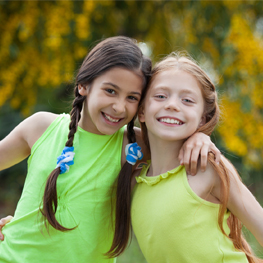
Driving home, you ask your kids what happened at school today. Your son mumbles, “Nothing,” in his casual, I-dare-you-to-ask-for-more-information kind of way. Before you can follow up, your daughter chimes in, “I hate Maddie. She told Sarah she thinks my hair is ugly, and now Sarah won’t let me sit with them at lunch. They’re not my friends anymore. I hate them both.”
Catching kids’ feelings
Whew! When you asked your daughter about her day, you were hoping to hear she had aced her spelling test. Instead, you’re sitting in the driver’s seat wondering how to navigate a tricky emotional situation.
Kids may be overwhelmed if they don’t know how to handle their feelings, so they pass them on to adults, says Lawrence Cohen, Ph.D., psychologist and author of Playful Parenting. This eases their distress and frees kids to explore what’s happening without getting stuck on issues they can’t solve.
Parents don’t have it so easy. We may feel our kids’ pain as if it were our own, especially if their experiences cause us to revisit our own childhood turmoil, says Cohen. As parents grapple with their own feelings, they may unintentionally make things worse for kids by asking probing questions like, “Why didn’t Sarah stick up for you?” or, “Did something else happen between you three?”
Michael Thompson, Ph.D., clinical psychologist and co-author of Best Friends, Worst Enemies calls this “interviewing for pain.” And, he says, this approach can backfire. It may cause kids to become more upset and confused instead of helping them move on. Although kids’ clashes are uncomfortable for parents, it’s best if parents support without intruding. Conflict is a crucible for social development.
Why conflict occurs and what kids learn from it
We all want to feel a sense of connection to others and to be recognized as competent, powerful individuals. Your child’s desires to sit with the ‘cool’ kids at lunch, make the dance team, and win an award in the science fair grow out of these needs for connection, achievement, and status.
The recipe for dissonance goes something like this: Create a close bond between friends, add a spirit of competitiveness, and an ounce of ‘I’m-better-than-you-are’ and voilà! You’ve got conflict. Winning friends and earning bragging rights on Super Mario aren’t incompatible goals in the long-term, but on any given afternoon can cause friction.
While it’s tempting to wish for perpetual harmony, a reasonable amount of conflict is good for kids. “There’s no doubt that some of the most important lessons our kids will learn don’t happen in the classroom, but with a friend or two during playtime,” says Michelle Borba, Ed.D., author of Nobody Likes Me, Everybody Hates Me. A child’s sense of personal identity develops as they see themself through the eyes of their friends.
When disagreements arise, kids learn to negotiate, to stand up for themselves, and to communicate their values. And when they mess up, they learn to take responsibility and make apologies, reminds Borba. These social skills stick with kids into adulthood and are critical to school and career success. While parents can help kids learn from their experiences, we can’t learn these lessons for them.
How to support kids’ friendship skill-building
Getting involved in kids’ social lives can feel like stepping into a minefield - you don’t know where hot issues are buried and missteps can cause emotional explosions.
Use these strategies to support your kids through trying times in social development:
Create opportunities. Kids don’t want parents to manage their social lives - that just isn’t cool. To help kids make friends, parents have to be stealthy. Invite another family over for dinner and let the kids entertain themselves while the grown-ups talk. Your kids may groan initially, but they’ll rise to the occasion. Step back and let the kids get acquainted through play. Share family activities often if the kids hit it off.
Put problems in perspective. Though it’s easy to dismiss kids’ social woes as insignificant, research conducted at University of California Los Angeles shows social rejection activates the same brain areas responsible for physical pain: being left out really does hurt. Just don’t overreact. It’s likely your child will get over the hurt, reconcile with their friend, or find a new one.
Check your expectations. Kids vary widely in how many friends they have and the depth of those relationships. “How many friends our kids have isn’t the issue,” says Borba. What matters most are your child’s feelings about oneself and their relationships with their peers. Friendship should be a (mostly) positive experience.
Be a sounding board. Resist the urge to clean up your child’s friendship fallout by calling the friend’s parent or telling your child what to do. Instead, listen compassionately to what happened and absorb the weight of your child’s sadness. With your emotional support, they’ll find their own way to mend the rift.
Quarrels and breakups happen, and painful feelings may linger. Often, but not always - after some time or a shift in activities - kids find a way to make up. To parents, it may seem like kids break up and make up too easily. They go from best friends to worst enemies and back again before we know what’s happening.
Whether friends come or go, parents can offer an accepting smile, a listening ear, and a shoulder to cry on. But we can’t make them empathize, sort out their feelings, force an apology, or fix their friendships. Some lessons only friends can teach.
Heidi Smith Luedtke, Ph.D., is a personality psychologist and author of Detachment Parenting: 33 Ways to Keep Your Cool When Kids Melt Down.
Calgary’s Child Magazine © 2024 Calgary’s Child